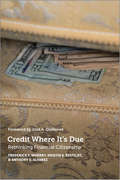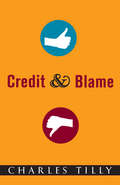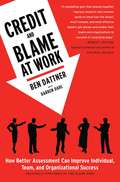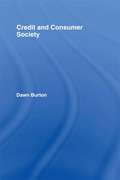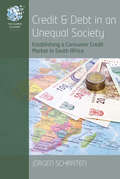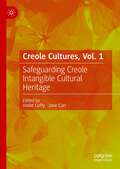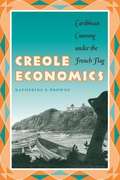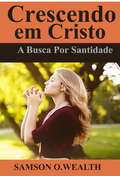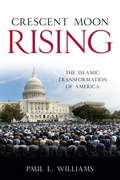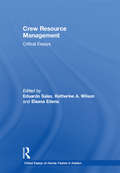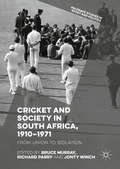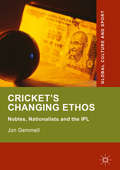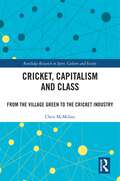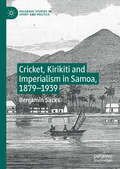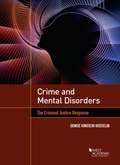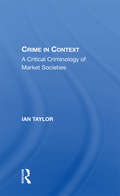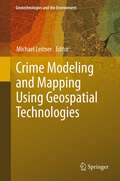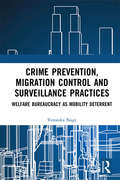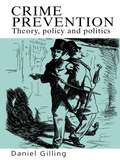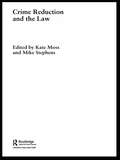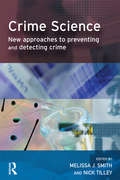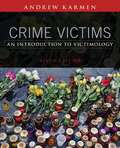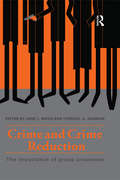- Table View
- List View
Credit Where It's Due: Rethinking Financial Citizenship
by Frederick F. Wherry Kristin S. Seefeldt Anthony S. Alvarez Jose QuinonezAn estimated 45 million adults in the U.S. lack a credit score at time when credit invisibility can reduce one’s ability to rent a home, find employment, or secure a mortgage or loan. As a result, individuals without credit—who are disproportionately African American and Latino—often lead separate and unequal financial lives. Yet, as sociologists and public policy experts Frederick Wherry, Kristin Seefeldt, and Anthony Alvarez argue, many people who are not recognized within the financial system engage in behaviors that indicate their credit worthiness. How might institutions acknowledge these practices and help these people emerge from the financial shadows? In Credit Where It’s Due, the authors evaluate an innovative model of credit-building and advocate for a new understanding of financial citizenship, or participation in a financial system that fosters social belonging, dignity, and respect. Wherry, Seefeldt, and Alvarez tell the story of the Mission Asset Fund, a San Francisco-based organization that assists mostly low- and moderate-income people of color with building credit. The Mission Asset Fund facilitates zero-interest lending circles, which have been practiced by generations of immigrants, but have gone largely unrecognized by mainstream financial institutions. Participants decide how the circles are run and how they will use their loans, and the organization reports their clients’ lending activity to credit bureaus. As the authors show, this system not only helps clients build credit, but also allows them to manage debt with dignity, have some say in the creation of financial products, and reaffirm their sense of social membership. The authors delve into the history of racial wealth inequality in the U.S. to show that for many black and Latino households, credit invisibility is not simply a matter of individual choices or inadequate financial education. Rather, financial marginalization is the result of historical policies that enabled predatory lending, discriminatory banking and housing practices, and the rollback of regulatory protections for first-time homeowners. To rectify these inequalities, the authors propose common sense regulations to protect consumers from abuse alongside new initiatives that provide seed capital for every child, create affordable short-term loans, and ensure that financial institutions treat low- and moderate-income clients with equal respect. By situating the successes of the Mission Asset Fund in the larger history of credit and debt, Credit Where It’s Due shows how to prioritize financial citizenship for all.
Credit and Blame
by Charles TillyIn his eye-opening book Why?, world-renowned social scientist Charles Tilly exposed some startling truths about the excuses people make and the reasons they give. Now he's back with further explorations into the complexities of human relationships, this time examining what's really going on when we assign credit or cast blame. Everybody does it, but few understand the hidden motivations behind it. With his customary wit and dazzling insight, Tilly takes a lively and thought-provoking look at the ways people fault and applaud each other and themselves. The stories he gathers in Credit and Blame range from the everyday to the altogether unexpected, from the revealingly personal to the insightfully humorous--whether it's the gushing acceptance speech of an Academy Award winner or testimony before a congressional panel, accusations hurled in a lover's quarrel or those traded by nations in a post-9/11 crisis, or a job promotion or the Nobel Prize. Drawing examples from literature, history, pop culture, and much more, Tilly argues that people seek not only understanding through credit and blame, but also justice. The punishment must fit the crime, accomplishments should be rewarded, and the guilty parties must always get their just deserts. Brilliantly conceived and masterfully written, Credit and Blame is a book that revolutionizes our understanding of the compliments we pay and the accusations we make.
Credit and Blame at Work: How Better Assessment Can Improve Individual, Team and Organizational Success
by Ben DattnerPreviously published as The Blame Game, this acclaimed guide by a leading workplace expert offers essential advice about how to succeed at work by avoiding the pitfalls of pervasive credit-grabbing and finger-pointing.Credit and Blame at Work, praised by bestselling management expert Robert Sutton as “a modern management classic; one of the most well-crafted business books I have ever read,” psychologist and workplace consultant Ben Dattner reveals that at the root of the worst problems at work is the skewed allocation of credit and blame. It’s human nature to resort to blaming others, as well as to take more credit for successes than we should. Many managers also foster a “blame or be blamed” culture that can turn a workplace into a smoldering battlefield and upend your career. Individuals are scapegoated, teams fall apart, projects get derailed, and people become disengaged because fear and resentment take hold. But Dattner shows that we can learn to understand the dynamics of this bad behavior so that we can inoculate ourselves against it. In lively prose, Dattner tells a host of true stories from individuals and teams he’s worked with, identifying the eleven personality types who are especially prone to credit and blame problems and introducing simple methods for dealing with each of them. The rich insights and powerful practical advice Dattner offers allow readers to master the vital skills necessary for rising above the temptations of the blame game, defusing the tensions, and achieving greater success.
Credit and Consumer Society
by Dawn BurtonThe language of credit and debt is almost ubiquitous in daily life. In advanced modern societies, financial institutions and other organizations have become increasingly active in lending money to consumers, and consumers apparently more than willing to take advantage. This groundbreaking new book offers an analysis of this important phenomenon, arguing that we have entered an era in which credit and debt are sanctioned, delivered and collected through new cultural and economic mechanisms. Written in an accessible and straightforward style, the book takes a multi-disciplinary approach, examining consumer credit and debt in both societal and economic contexts. It explores key topics such as: the historical context of credit and debt current theories of a consumer-centred society the credit industry attempts at government regulation. Credit and Consumer Society establishes the wider analysis of consumer credit and debt as a discipline in its own right. It is important reading for students and researchers in business and management, finance, public policy and sociology, as well as for policy makers and consumer groups working directly in this field.
Credit and Debt in an Unequal Society: Establishing a Consumer Credit Market in South Africa (The Human Economy #7)
by Jürgen SchratenSouth Africa was one of the first countries in the Global South that established a financialized consumer credit market. This market consolidates rather than alleviates the extreme social inequality within a country. This book investigates the political reasons for adopting an allegedly self-regulating market despite its disastrous effects and identifies the colonialist ideas of property rights as a mainstay of the existing social order. The book addresses sociologists, political scientists, anthropologists and legal scholars interested in the interaction of economy and law in contemporary market societies.
Credit to Capabilities
by Paromita SanyalCredit to Capabilities focuses on the controversial topic of microcredit's impact on women's empowerment and, especially, on the neglected question of how microcredit transforms women's agency. Based on interviews with hundreds of economically and socially vulnerable women from peasant households, this book highlights the role of the associational mechanism - forming women into groups that are embedded in a vast network and providing the opportunity for face-to-face participation in group meetings - in improving women's capabilities. This book reveals the role of microcredit groups in fostering women's social capital, particularly their capacity of organizing collective action for public goods and for protecting women's welfare. It argues that, in the Indian context, microcredit groups are becoming increasingly important in rural civil societies. Throughout, the book maintains an analytical distinction between married women in male-headed households and women in female-headed households in discussing the potentials and the limitations of microcredit's social and economic impacts.
Creole Cultures, Vol. 1: Safeguarding Creole Intangible Cultural Heritage
by Violet Cuffy Jane CarrThis edited collection considers the significance of Creole cultures within current, changing global contexts. With a particular focus on post-colonial Small Island Developing States, it brings together perspectives from academics, policy makers and practitioners including those based in Dominica, St Lucia, Seychelles and Mauritius. Together they provide a rich exploration of issues that arise in relation to safeguarding the intangible cultural heritage that sustains Creole identities. Commencing with considerations of the UNESCO (2003) Convention for the Safeguarding of the Intangible Cultural Heritage (ICH), the collection then presents case studies from the Seychelles, Mauritius, St. Lucia and Dominica. These attest to the many and different ways through which Creole cultural practices remain significant to the lived experiences of Creole communities. These chapters exemplify how through activities such as storytelling, singing, dancing, making artworks and the alternative economic practice of koudmen, Creole peoples sustain cultural identities that draw strength from their traditions. Yet there is also recognition of the continual struggle to sustain Creole cultural practices in the face of global economic and political pressures and related uncertainties. This global economic landscape also has an impact upon how Creole cultures are presented to tourists and hence upon the ways in which cultural practices are supported.
Creole Economics: Caribbean Cunning under the French Flag
by Katherine E. BrowneBrowne draws on a decade of ethnographic fieldwork and interview data from all socioeconomic sectors to question the common understanding of informal economies as culture-free, survival strategies of the poor. Anchoring her own insights to longer historical and literary views, the author shows how adaptations of cunning have been reinforced since the days of plantation slavery. These adaptations occur, not in spite of French economic and political control, but rather because of it. Powered by the "essential tensions" of maintaining French and Creole identities, the practice of creole economics provides both assertion of and refuge from the difficulties of being dark-skinned and French. This powerful ethnographic study shows how local economic meanings and plural identities help explain work off the books. Like creole language and music, creole economics expresses an irreducibly complex blend of historical, contemporary, and cultural influences.
Crescendo em Cristo: O Mistério Escondido do Crescimento Espiritual
by Samson O. WealthVocê deseja elevar seu relacionamento com Deus para o próximo nível? Sim, eu sei; Todos nós temos essa paixão de seguir a Deus e fazer a vontade dele. Mas há um grande obstáculo que nos impede. E essa é a nossa carne. Ainda somos presos pelo pecado e escravizados por atitudes sem Deus, vícios e hábitos pecaminosos. Mas quem pode nos salvar deste fardo do pecado e da morte? A resposta é simples - JESUS É O CAMINHO. Sem a ajuda de nosso Senhor Jesus, você não pode crescer em Cristo e começar a viver uma vida santa, que o levará ao céu. Mas, para o Senhor ajudá-lo a crescer nele, há certas coisas que você deve colocar em prática para se tornar um cristão notável. Com a ajuda do Espírito Santo, este livro está repleto de mistérios ocultos que farão com que você comece a experimentar um tremendo crescimento em Cristo imediatamente. Este livro não apenas abre seus olhos, mas também lhe dá conselhos práticos sobre como viver uma vida santa e cheia do Espírito. Veja o que você aprenderá neste livro: • Por que você não está crescendo em Cristo? • Forças ocultas que estão lutando contra o seu crescimento espiritual, para que você acabe no inferno • Os passos necessários você pode começar a aplicar imediatamente para se tornar um gigante espiritual • Forças que você sempre precisa estar em guerra, se você quer ser um vencedor • As três regras fundamentais de ouro para praticar se você quer deixar a carnalidade para viver a espiritualidade Vá buscar este livro e descubra como você pode ampliar seu relacionamento com Deus hoje.
Crescent Moon Rising
by Paul L. WilliamsInformative and at times controversial, this book examines the rise of Islam in American and clearly shows it will be a force to reckon with for some time. In 1975, Leo Rosten published his Religions of America, an exhaustive compilation of statistical information on every major and minor group of believers in the country. In retrospect, it may seem surprising that the book contained no discussion of Islam. But this was not an oversight; for at the time Muslims in America were a statistically insignificant minority, numbering fewer than one thousand individuals. By contrast, Islam is today the second-largest and fastest growing religion in America, with more than six million adherents. In the first half of the book, the author traces the beginnings of Islam in this country, in particular the rise and influence of the Nation of Islam among African Americans. He emphasizes the impact of the 1965 Hart-Cellar Act, which abolished national-origin quotas and led to successive waves of Muslim immigrants, who entered this country from Palestine, Kuwait, Iraq, Southeast Asia, Africa, Turkey, and other parts of the world. In the second half, Williams considers statistical studies of American Muslims regarding age groups, family size, professional affiliations, annual income, and religious and political commitments. He also addresses a number of disturbing concerns about some aspects of the Muslim presence in America. These include: the connections between many American mosques with Saudi benefactors who promote an ultra-orthodox, anti-Western agenda; the existence of Muslim paramilitary training grounds recruiting ex-convicts; and the ties of even self-described moderate Muslim spokespersons with more politically radical elements.
Crew Resource Management: Critical Essays (Critical Essays on Human Factors in Aviation)
by Eduardo Salas, Katherine A. Wilson and Eleana EdensCrew Resource Management (CRM) training was first introduced in the late 1970s as a means to combating an increased number of accidents in which poor teamwork in the cockpit was a significant contributing factor. Since then, CRM training has expanded beyond the cockpit, for example, to cabin crews, maintenance crews, health care teams, nuclear power teams, and offshore oil teams. Not only has CRM expanded across communities, it has also drawn from a host of theories from multiple disciplines and evolved through a number of generations. Furthermore, a host of methodologies and tools have been developed that have allowed the community to better study and measure its effect on team performance and ultimately safety. Lacking, however, is a forum in which researchers and practitioners alike can turn to in order to understand where CRM has come from and where it is going. This volume, part of the 'Critical Essays on Human Factors in Aviation' series, proposes to do just that by providing a selection of readings which depicts the past, present, and future of CRM research and training.
Cricket and Society in South Africa, 1910–1971: From Union To Isolation (Palgrave Studies in Sport and Politics)
by Richard Parry Bruce Murray Jonty WinchThis book explores how cricket in South Africa was shaped by society and society by cricket. It demonstrates the centrality of cricket in the evolving relationship between culture, sport and politics starting with South Africa as the beating heart of the imperial project and ending with the country as an international pariah. The contributors explore the tensions between fragmentation and unity, on and off the pitch, in the context of the racist ideology of empire, its ‘arrested development’ and the reliance of South Africa on a racially based exploitative labour system. This edited collection uncovers the hidden history of cricket, society, and empire in defining a multiplicity of South African identities, and recognises the achievements of forgotten players and their impact.
Cricket's Changing Ethos (Global Culture and Sport Series)
by Jon GemmellThis book examines historically how cricket was codified out of its variant folk-forms and then marketed with certain lessons sought to reinforce the values of a declining landed interest. It goes on to show how such values were then adapted as part of the imperial experiment and were eventually rejected and replaced with an ethos that better reflected the interests of new dominant elites. The work examines the impact of globalisation and marketization on cricket and analyses the shift from an English dominance, on a sport that is ever-increasingly being shaped by Asian forces. The book’s distinctiveness lies in trying to decode the spirit of the game, outlining a set of actual characteristics rather than a vague sense of values. An historical analysis shows how imperialism, nationalism, commercialism and globalisation have shaped and adapted these characteristics. As such it will be of interest to students and scholars of sport sociology, post-colonialism, globalisation as well as those with an interest in the game of cricket and sport more generally.
Cricket, Capitalism and Class: From the Village Green to the Cricket Industry (Routledge Research in Sport, Culture and Society)
by Chris McMillanThis ambitious new study argues that not only is the story of cricket inescapably entwined with that of capitalism, but that the game provides a unique lens with which to understand the history, development, exigencies and contradictions of capitalist political economy. From the aristocratic capture of the artisan’s game to the commodified entertainment of private T20 leagues, the story of cricket has been told against the background of capitalism. Cricket was the gentlemanly vanguard of the English-led British empire which forged the first iteration of international capitalism that was reliant upon a political and commercial partnership between rulers and the ruled, and today it speaks to the productive tension between the emergence of the Asian century and the power of American cultural imperialism. Reading capitalism as a cultural, economic and political system, this book explores the relationship between cricket and capitalism, and illuminates many of the most important themes in contemporary sport studies, such as class, race, gender, globalisation, nationalism, neoliberalism, commodification and migration. This is fascinating reading for anybody with an interest in sport history, the sociology of sport, global political economy, political theory or cultural studies.
Cricket, Kirikiti and Imperialism in Samoa, 1879–1939 (Palgrave Studies in Sport and Politics)
by Benjamin SacksThis book considers how Samoans embraced and reshaped the English game of cricket, recasting it as a distinctively Samoan pastime, kirikiti. Starting with cricket’s introduction to the islands in 1879, it uses both cricket and kirikiti to trace six decades of contest between and within the categories of ‘colonisers’ and ‘colonised.’ How and why did Samoans adapt and appropriate the imperial game? How did officials, missionaries, colonists, soldiers and those with mixed foreign and Samoan heritage understand and respond to the real and symbolic challenges kirikiti presented? And how did Samoans use both games to navigate foreign colonialism(s)? By investigating these questions, Benjamin Sacks suggests alternative frameworks for conceptualising sporting transfer and adoption, and advances understandings of how power, politics and identity were manifested through sport, in Samoa and across the globe.
Crim Just & Soc Recon Ils 203 (International Library of Sociology)
by Hermann MannheimFirst published in 1998. Routledge is an imprint of Taylor & Francis, an informa company.
Crime And Mental Disorders: The Criminal Justice Response (Higher Education Coursebook)
by Denise Gosselin<p>The newest entry in the cutting edge topic of Mental Illness and Crime, this book from Denise Gosselin is practically focused and straightforward in its approach. It's clear, concise writing style avoids jargon and will engage both undergraduate and graduate students. It includes discussions of understanding mental illness, the changing landscape of criminal justice and mental illness, criminal justice responses to mental illness, alternatives to incarceration and global issues. An accompanying website includes Test Banks and other instructional materials. <p>Organized into five sections: <p> <li>Part I UNDERSTANDING MENTAL ILLNESS concern the history (past and present), classifications, and introduction to the criminal justice issues on the responses to people with mental illness. <li>Part II THE CHANGING LANDSCAPE examines the criminal justice involved encounters that occur outside of the traditional system, involving intervention, collaboration, and civil commitment. <li>Part III CRIMINAL JUSTICE RESPONSES look at law and policy of law enforcement, the criminal court and corrections. <li>Part IV ALTERNATIVES TO INCARCERATION reflects recent changes to reentry and community corrections. The juvenile justice component includes the brief system responses to juveniles with mental disorders. <li>Part V GLOBAL ISSUES stands alone as chapter 14 to remind us that we are not alone! The issues and system responses are not unique to the United States. </li> </p>
Crime In Context: A Critical Criminology Of Market Societies
by Ian TaylorAt the end of the twentieth century, the bookstores are full of books on crime, though this title will certainly not find a place on the same shelves. In the massive Waterstones bookstore in the city of Manchester, England, where I lived through most of the 1990s, the ground floor display area was rearranged in 1995 so as to accommodate, right at the front of the store, several hundred new titles, on topics like Serial Murderers and Sexual Crimes of the Twentieth Century.l Several of these new books are companion volumes to movies on release in the city's cinemas or, in some instances, are simply the original text on which the movies are based. The movies in question - Shallow Grave, Silence of the Lambs, Reservoir Dogs, Natural Born Killers and others - focus heavily on interpersonal violence and murder and also place great emphasis in the manner of many earlier cinematic genres - on the idea of the 'criminal mind' (not least, as a way of dramatizing the detection of the originating criminal act) but also - to a significant extent, these are movies which emphasize the idea and contemporary social presence of evil. Similar moral and psychologistic preoccupations are now also widely apparent on primetime television - most notably, in Britain, in the extraordinarily powerful Cracker series, produced by Granada Television in 1994 and 1995, watched by over 15 million people, and featuring, inter alia, the forensic investigation' of serial and sexual murders, some of them extremely graphically displayed (Crace 1994).2 The prominence of 'Gothic' themes in movies about violent death is not new in itself: there is a long history of interest in the cinema in horror and, indeed, in 'transgression' and evil. What may be definitive about the present genre of movies as well as the range of fictional and non-fictional titles in the bookstores about crime is the overwhelming focus on murder and killing represented in very contemporary and mundane, ordinary and, indeed, 'respectable' settings, and the powerful suggestion that these movies are a representation of the risks and dangers involved in everyday life at the end of the twentieth century. The bookstore display in Waterstones is straightforwardly called the 'Real Crimes' section.
Crime Modeling and Mapping Using Geospatial Technologies (Geotechnologies and the Environment #8)
by Michael LeitnerRecent years in North America have seen a rapid development in the area of crime analysis and mapping using Geographic Information Systems (GIS) technology. In 1996, the US National Institute of Justice (NIJ) established the crime mapping research center (CMRC), to promote research, evaluation, development, and dissemination of GIS technology. The long-term goal is to develop a fully functional Crime Analysis System (CAS) with standardized data collection and reporting mechanisms, tools for spatial and temporal analysis, visualization of data and much more. Among the drawbacks of current crime analysis systems is their lack of tools for spatial analysis. For this reason, spatial analysts should research which current analysis techniques (or variations of such techniques) that have been already successfully applied to other areas (e.g., epidemiology, location-allocation analysis, etc.) can also be employed to the spatial analysis of crime data. This book presents a few of those cases.
Crime Prevention, Migration Control and Surveillance Practices: Welfare Bureaucracy as Mobility Deterrent
by Veronika NagyEU expansion has stoked fears that criminals from the East may abuse freedom of movement to exploit the benefit systems of richer states. This book examines the way in which physical state borders are increasingly being replaced by internal border controls in the form of state bureaucracies as a means of regulating westward migration. The work examines the postmodern effect of globalisation and how ontological anxieties contribute to securitisation and social sorting in Western countries. It discusses the changes in control societies and how targeted surveillance as a geopolitical tool leads to new digitalised mechanisms of population selection. The book presents a casestudy of Roma migrants in the UK to examine the coping strategies adopted by those targeted. The book also critically evaluates the limitations of digitalised bureaucratic systems and the dangers of reliance on virtual data and selection methods.
Crime Prevention: Theory, Policy And Practice
by Daniel GillingFirst published in 1997. Routledge is an imprint of Taylor & Francis, an informa company.
Crime Reduction and the Law
by Kate Moss Mike StephensThis innovative and pioneering new book establishes links between crime reduction and the law, uniquely offering a detailed examination of how specific legislation and performance targets aid or undermine attempts at crime reduction. Providing a sustained analysis, this ground-breaking book considers the social policy, politics and legislation that surround and drive the crime reduction agenda. It analyzes: the creation of 'safe environments' through Town and Country Planning legislation the role of local authorities in crime reduction initiatives the nature of drug policy, paedophilia legislation and programs to control mental disorder crime. Bringing together the work of internationally renowned experts in this field, this book will prove very useful to students of criminology and sociology, as well as crime prevention and reduction practitioners, police officers and community safety partnership professionals.
Crime Science (Crime Science Series)
by Nick Tilley Melissa J. SmithThis book provides an introduction to crime science, setting out its essentials. It provides a major statement of the nature and aspirations of crime science, and presents a series of case studies providing examples, in different settings, of the approach in action, ranging from preventing crime within correctional institutions to the use of techniques such as DNA fast tracking for burglary.
Crime Victims: An Introduction To Victimology (Ninth Edition)
by Andrew KarmenA first in the field when initially published and now a true classic, CRIME VICTIMS: AN INTRODUCTION TO VICTIMOLOGY, Ninth Edition offers the most comprehensive and balanced exploration of victimology available today. The author examines the victims' plight, carefully placing statistics from the FBI's Uniform Crime Report and Bureau of Justice Statistics National Crime Victimization Survey in context. At the same time, he "humanizes" victims' stories through compelling case studies. The text systematically investigates how victims are currently handled by the criminal justice system, analyzes the goals of the victims' rights movement, and discusses what the future is likely to hold. This Ninth Edition presents current coverage of the seriousness of intimate partner violence, child abuse, sexual assaults in the U. S. military, acquaintance rapes on college campuses, shootings on campuses, whether arming for self-protection is an effective strategy, and similar high-profile issues. It also includes new information about "survivorology" and "bystanderology" as well as new material on practical issues facing victims.
Crime and Crime Reduction: The importance of group processes
by Theresa A. Gannon Jane L. WoodThe problems associated with groups that commit crime are well known and notoriously complex. However, there are many questions that we still cannot answer with certainty. This book seeks to deepen understanding of the group processes involved in crime and the treatment of offenders’ thoughts and behaviour. Together, the chapters in this volume address the following questions: Are people more likely to commit crime because of the influence of their group? Does group membership cause people to become criminals, or does the group merely foster people’s pre-existing criminal inclinations? How does group membership exert such a strong hold on people so that some risk imprisonment or even death, rather than relinquish their membership? The contributors to Crime and Crime Reduction consider the social psychological influences of groups and specific forms of group crime such as street and prison gangs, terrorism, organized criminal networks, and group sexual offending. The book also addresses important questions about the role of groups in treating offenders, and why existing group membership should be considered when treating offenders. Group criminal activity is a key area of study for researchers and for students of Forensic Psychology and Criminology courses. This book will therefore be of interest to students, scholars, and law enforcement practitioners who want to understand the group processes involved in crime and its reduction.
